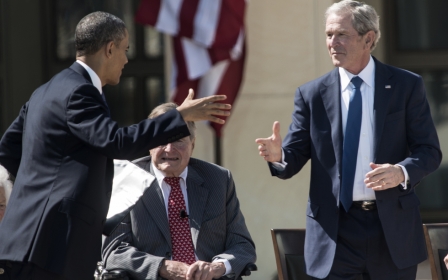The failure of Obama's 'liberal realism'

The world owes a great debt to Jeffrey Goldberg. His new contribution to the understanding of foreign policy is a vast and wide-ranging interview, published in The Atlantic, with US President Barack Obama. It is an undertaking which allows the president, soon to be out of office, to explain at length his views on foreign affairs and his programme for the world at large. This setting out of the "Obama Doctrine" is both fascinating and salutary.
One conclusion, however, is almost inescapable: when one compares Obama's rhetoric to the events which have shaped the world and the currents of its politics during his time in office, the president’s "liberal realism" simply has not held up. In fact, it is not a positive philosophy at all; and it seems true to state that such ideas eventually degenerate into positively amoral polices. This apparent transformation can be seen in the state of much of the world as Obama prepares to vacate the White House.
A particularly interesting aspect of the interview noted Obama’s confessed approval for the foreign policy of George HW Bush and his national security advisor Brent Scowcroft. This at first seems odd. Obama is a Democrat; Bush, on the other hand, was a Republican head of state (indeed, many of the actions of George W Bush, whose foreign policy Obama has been so keen to transcend or cast aside, have been attributed to the influence of Bush’s father). But aside from like-father-like-son generalities, such an apparently odd comparison soon becomes more explicable.
Goldberg is understandably effusive in talking about those his subject admires – especially Scowcroft ("'I love that guy,' Obama once told me"). In this rosy telling "Bush and Scowcroft removed Saddam Hussein’s army from Kuwait in 1991." But this is not the whole story, and what would follow in many ways prefigures some of the more tragic episodes of Obama’s own time in office.
After defeating the Iraqi army and forcing it to evacuate Kuwait, Bush had his generals halt. Instead Bush delivered a speech, justly infamous, in which he seemingly urged the Iraqis "to take matters into their own hands" and remove Saddam.
Many took this as a guarantee of US support for the reconstruction of an Iraq free from tyranny, and gleefully rose up, trying to overthrow the regime. But this was not to be; Saddam’s army, in possession of helicopters, massacred the rebels and retained control of Iraq. The "realists" within Bush’s administration simply accepted this fact and moved on, perhaps to deal with more important matters of international policy.
In many ways Obama's ideas of foreign policy have followed this tragic path, and have led to nothing less than American support, tacit or stated explicitly, for tyrants and expansionists of all stripes.
A particularly telling vignette is relayed by Goldberg in his piece: "In recent days, the president has taken to joking privately, 'All I need in the Middle East is a few smart autocrats'." This comment is troubling, not least because it suggests that the president has on some level fallen for the false claim that tyranny can be acceptable if it brings "stability".
This stance alone is amoral in nature – in many ways it is a repudiation of foreign policy carried out for the good of mankind rather than the convenience of those in power – but it is made worse because it is simply untrue. Despots do not make stable rulers; one need only observe the deliberate destruction of the Libyan state under Gaddafi, which was intensified when his rule was under threat. You can also look at the extent to which the regime of Bashar al-Assad puts its own survival ahead of that of Syria and its people. Obama's comment was made in jest, but it betrays a great deal of amoral political calculation.
In his desire for the United States to take a back seat in world affairs, Obama has tolerated the armed expansion of Russia; the continuation of the Assad tyranny in Syria, despite its use of chemical weapons – something the president had declared a "red line"; the civil collapse we are witnessing in Libya, which is apparently treated by the president as if it is someone else’s problem (he accepts his own culpability in this failure only insofar as he "had more faith in the Europeans" than was wise); and the continued use by Iran of its proxies in Syria, Yemen, Iraq and elsewhere, which will only be exacerbated in the face of sanctions relief brought on by the nuclear deal and Obama’s remarkable suggestion that the Islamic Republic and its rival Saudi Arabia "share the neighbourhood".
It has become abundantly clear that Obama's strategy is neither liberal nor realistic, and that it has led to the proliferation of autocrats – or at least their continued survival – as well as the degeneration of states and the genesis of violence on a tremendous and terrifying scale.
Sadly for Obama, this is not the stuff of favourable political legacies, and nor, it must be remembered, will the citizens of the Middle East and elsewhere look to the American president with anything like the hope they once possessed. The "Obama Doctrine" has barely received its first exposition, but it is already a failure – and a more costly failure than many can even begin to imagine.
- James Snell is a British journalist who has written for numerous international publications, including National Review, The American Spectator, New Humanist and Free Inquiry.
The views expressed in this article belong to the author and do not necessarily reflect the editorial policy of Middle East Eye.
Photo: Stress Heads of US President Barack Obama are on display at the Weekly Standard booth during annual Conservative Political Action Conference of the American Conservative Union on 4 March, 2016 in National Harbor, Maryland (AFP).
New MEE newsletter: Jerusalem Dispatch
Sign up to get the latest insights and analysis on Israel-Palestine, alongside Turkey Unpacked and other MEE newsletters
Middle East Eye delivers independent and unrivalled coverage and analysis of the Middle East, North Africa and beyond. To learn more about republishing this content and the associated fees, please fill out this form. More about MEE can be found here.





